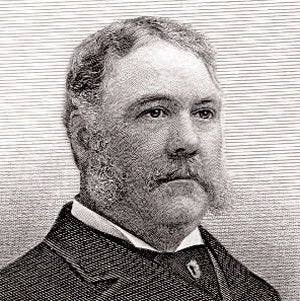
Your support helps us to tell the story
From reproductive rights to climate change to Big Tech, The Independent is on the ground when the story is developing. Whether it's investigating the financials of Elon Musk's pro-Trump PAC or producing our latest documentary, 'The A Word', which shines a light on the American women fighting for reproductive rights, we know how important it is to parse out the facts from the messaging.
At such a critical moment in US history, we need reporters on the ground. Your donation allows us to keep sending journalists to speak to both sides of the story.
The Independent is trusted by Americans across the entire political spectrum. And unlike many other quality news outlets, we choose not to lock Americans out of our reporting and analysis with paywalls. We believe quality journalism should be available to everyone, paid for by those who can afford it.
Your support makes all the difference.
Chester A Arthur arrived in the White House with a reputation as a Party man: an enthusiastic advocate of the shamelessly political patronage that had flourished under Ulysses Grant. He had been nominated to the vice-presidency largely to placate the "stalwart" wing of the Republican party, which approved of such patronage.
As President, however, Arthur broke decisively with his former cronies, to the fury of Republican power brokers such as Roscoe Conkling. Continuing where Garfield and Hayes had left off, he attempted to curb irresponsible "pork barrel" spending and conscientiously pursued the cause of civil service reform. In 1883, he signed into law the Pendleton Act, which established a bipartisan Civil Service Commission, protected employees against removal for political reasons, and made certain Government positions obtainable only through competitive written examinations.
It has subsequently been theorised that his unexpected independence of spirit may have owed something to his knowledge, kept secret since the first year of his presidency, that he was dying of Bright's disease, an incurable kidney disorder. He was not re-nominated in 1884 and, after briefly resuming his career as a lawyer, died in 1886.
In his own words
"Men may die, but the fabrics of our free institutions remain unshaken. No higher or more reassuring proof could exist of the strength and permanence of popular government than the fact that though the chosen of the people be struck down his constitutional successor is peacefully installed without shock or strain except the sorrow which mourns the bereavement."
"I may be President of the United States, but my private life is nobody's damned business."
In others' words
"No man ever entered the Presidency so profoundly and widely distrusted, and no one ever retired... more generally respected." Alexander K McClure
"A nonentity with side whiskers." Woodrow Wilson
Minutiae
Arthur had a reputation as a dandy and was the first president to employ a full-time valet. It was said that he owned at least 80 pairs of trousers.
Before moving into the White House, he auctioned off 24 wagon-loads of presidential memorabilia to souvenir-hunters. He used the proceeds to pay for a lavish refurbishment.
Join our commenting forum
Join thought-provoking conversations, follow other Independent readers and see their replies
Comments